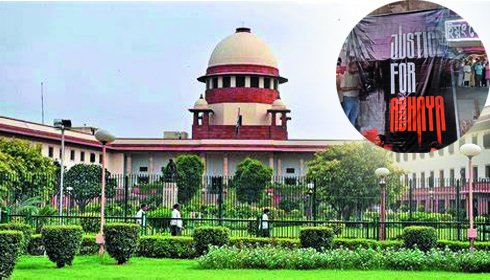
CJI Cautions Against Premature Disclosures in RG Kar Case, Emphasizes Truth-Seeking by CBI
In a significant development in the ongoing investigation into the brutal rape and murder of a junior doctor at Kolkata's RG Kar Medical College, the Chief Justice of India (CJI) issued a stern reminder of the case's sensitivity today, urging all parties involved to avoid premature disclosures. The CJI emphasised the intricacies of the case and warned that disclosing specifics at this time could jeopardise the Central Bureau of Investigation's (CBI) efforts to find the truth.
"Making a disclosure today of what the CBI is investigating will jeopardise the process," the CJI said during the hearing. His comments come in reaction to increased public interest in the inquiry, which has already resulted in the arrest of the Station House Officer (SHO) involved in the matter. The CJI's cautious position reflects broader concerns about the implications of unregulated information exchange on the ongoing investigation.
The CBI, which is leading the probe, has taken a thorough approach, focussing on uncovering the truth about the unfortunate incident. The CJI praised the CBI's diligence, emphasizing that their mission is to uncover the truth. He also acknowledged that the agency is addressing numerous significant concerns mentioned by the court, such as the procedure used during the post-mortem examination (PMR) and whether any evidence was tampered with or destroyed following the occurrence.
The SHO's arrest has given a new dimension to the probe, increasing concerns about law enforcement's role in the case. "The SHO has been arrested himself," the CJI stated, indicating that the inquiry has now shifted to the law enforcement authorities who were initially in charge of the matter. The court has also requested clarification from the CBI regarding other individuals' involvement in the incident.
"We have seen the status report, and the CBI has responded to all of the issues we have raised," the CJI added, expressing satisfaction with the investigation's progress to date. The court questioned several significant procedural issues, such as the timely filing of the charge sheet (challan), the authenticity of the PMR, and the possibility of tampered or destroyed evidence. The CJI's words imply that the court is actively following the probe and expects the CBI to respond to all outstanding concerns.
One of the key difficulties in the case is the alleged destruction of evidence, which has hampered the investigation since its commencement. Suspicions exist regarding the compromise of critical pieces of evidence, which could potentially implicate parties beyond the immediate suspects. CJI's focus on finding the truth shows that the court will investigate everything, including "any complicity by other persons" in the crime.
The RG Kar case has generated significant protests in West Bengal, with junior physicians demanding justice for their colleagues and systemic improvements to the healthcare system. The arrest of several prominent persons, including former hospital managers and police officers, has heightened public interest in the case. The involvement of the CBI, combined with the Supreme Court's monitoring, indicates that the inquiry is entering a critical phase, with implications for both law enforcement and the healthcare sector.
As the CBI conducts its investigation, the Supreme Court's emphasis on transparency and due process remains paramount. The CJI's remarks today highlight the delicate balance required to ensure a fair investigation while also maintaining the inquiry's credibility. "We will not allow any party to interfere with the process," the CJI stated, emphasising the court's resolve to let the CBI carry out its work free of external pressure or influence.
The RG Kar case remains one of the most keenly watched investigations in recent memory, with significant implications for both the medical and legal worlds. While the court expects further updates from the CBI, the larger issue of institutional accountability in cases involving medical professionals and law enforcement remains a major concern.